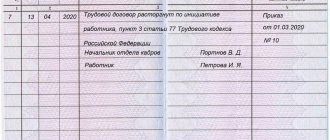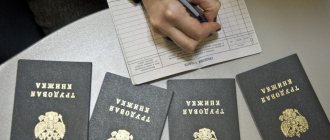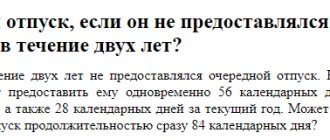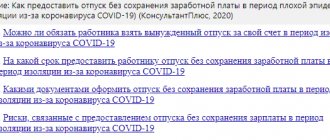Calculation of compensation upon dismissal in 2021, online calculator
If an employee decides to quit, then the employer is obliged to pay him upon dismissal compensation for unused vacation (Article 127 of the Labor Code of the Russian Federation). Of course, provided that the employee does not want to take off all unused vacation immediately before dismissal (he has such a right if the dismissal is not related to the employee’s guilty actions).
It will help to calculate compensation for unused vacation.
The dismissal compensation calculator makes calculations in several stages. First, the number of calendar days of unused vacation for which the employee is entitled to compensation is determined.
Then the amount of compensation itself is calculated.
To do this, you need to know the average daily earnings of the resigning employee. By the way, if necessary, the calculator will help you calculate your average daily earnings.
Articles on the topic (click to view)
- Fine for late payment of vacation pay
- What to do with unused vacation
- What to do if your employer does not pay vacation pay
- How long after employment is vacation allowed?
- Is maternity leave taken into account when calculating pensions?
- Accounting for compensation for unused vacation
- Dismissal while on maternity leave
Compensation for unused vacation is calculated using the following formula: The number of unused vacation days is, as a general rule, determined as the product of the number of vacation days allotted to the employee for each month of work (we divide annual vacation by 12) by the number of months worked for a particular employer, minus those already taken off. vacation days.
Please note that when calculating the number of months worked for an employer, there are some peculiarities (clause 35 of the Rules, approved.
NKT USSR 04/30/1930 N 169). So, if an employee worked less than half a month, then this month is excluded from the calculation, but if half or more, this month is counted as a whole month.
formula above). However, the number of unused vacation days is calculated differently: The employer must make all payments to an employee upon his dismissal on the last day of work of this employee (Article 140 of the Labor Code of the Russian Federation). Accordingly, the employee must also receive compensation for unused vacation on his last working day.
If the employer does not pay the resigning employee compensation for unused vacation, and the labor inspectorate finds out about this (for example, the employee writes a complaint), then the employer will be fined.
How to correctly calculate rest days, as well as receive compensation for vacation days not taken off - the head of the Service and Legal Directorate of the Contractual Legal Department of the Ministry of Internal Affairs of Russia, Colonel of the Internal Service Valentin Tkachev and the chief expert of the department of financial and civil legislation of the Service and Legal Directorate spoke about this and more Major of the Internal Service Olga Fedorova of the Contractual Legal Department of the Ministry of Internal Affairs of Russia.
Salary will help you
According to Part 1 of Art. 56 of the Federal Law of November 30, 2011 No. 342-FZ “On service in the internal affairs bodies of the Russian Federation and amendments to certain legislative acts of the Russian Federation” (hereinafter referred to as the Law on Service), an employee is provided with basic, additional, vacation leave, while maintaining monetary compensation, leave for personal reasons, leave upon graduation from an educational organization of higher education of the federal executive body in the field of internal affairs, other types of leave if their payment is provided for by the legislation of the Russian Federation.
Based on clauses 74 and 75 of the Procedure for providing monetary compensation to employees of internal affairs bodies of the Russian Federation, approved by order of the Ministry of Internal Affairs of Russia dated January 31, 2013 No. 65 (as amended by order of the Ministry of Internal Affairs of Russia dated December 28, 2015 No. 1237, registered with the Ministry of Justice of Russia on February 2, 2016, registration No. 40935) (hereinafter referred to as the Procedure), for the period of basic, additional, vacation leave, leave for personal reasons, leave after graduation from an educational organization of higher education of the Ministry of Internal Affairs of Russia, as well as other types of leave if their payment is provided for by the legislation of the Russian Federation, monetary allowance is paid based on the salary and monthly additional payments established on the day of departure for vacation. It is important to know that if the amount of salary changes while an employee is on vacation, he must be recalculated accordingly upon returning from vacation.
Every year, when an employee goes on basic leave, upon his report, by decision of the manager, financial assistance is provided in the amount of one salary established on the day of payment (clause 136 of the Procedure).
Days in exchange for money
In accordance with Art. 57 of the Law on Service, an employee’s main leave lasts 30 calendar days. When determining the duration of the main vacation, weekends and non-working holidays (but not more than 10 days) falling during the vacation period are not included in the number of calendar days of vacation.
The employee’s right to replace with monetary compensation part of the main leave exceeding 30 calendar days is provided for in Part 7 of Art. 56 of the Service Law. The time provided to the employee to travel to and from the vacation location cannot be replaced by monetary compensation.
An employee serving in the Far North, equivalent areas or other areas with unfavorable climatic or environmental conditions, incl. remote, as well as in harmful conditions, replacing part of the leave with monetary compensation is allowed only in the event of his dismissal from service in the internal affairs bodies.
Compensation for part of the vacation is paid based on the employee’s report and the manager’s order, which indicates the number of days to be compensated. The amount of compensation for each day of unused vacation is determined by dividing the amount of salary and monthly payments as part of the salary on the day of payment by the average monthly number of calendar days. The average monthly number of calendar days is determined by dividing the number of calendar days in a given calendar year by 12 (clauses 82, 83 of the Procedure).
From 14 and over
The period for granting vacation, determined by the vacation schedule, can be postponed by agreement with the employee in exceptional cases when the employee’s absence from service entails the impossibility of proper implementation by the federal executive body in the field of internal affairs, its territorial body, or subdivision of the functions established by the legislation of the Russian Federation. At the same time, according to Part 3 of Art. 57 of the Law on Service, an employee who has not exercised his right to basic leave within the period specified in the schedule must be granted leave at a time convenient for him before the end of the current year or during the next year. If an employee in the current year uses the main vacation for the current and past years, then a portion of each of these vacations exceeding 30 calendar days can be replaced with monetary compensation.
According to Part 4 of Art. 57 of the Law on Service, an employee, at his request, is allowed to divide his main leave into two parts, provided that one of the parts of this leave is not 14 calendar days.
Taking into account the provisions of Part 7 of Art. 56 and part 4 of Art. 57 of the Law on Service, the employee’s right to replace with monetary compensation a part of the main leave exceeding 30 calendar days is not limited and does not depend on the division of the main leave into parts.
Upon dismissal, compensation is provided and...
Relations related to the salary and pension provision of employees, the provision of living quarters, medical care for employees, citizens of the Russian Federation dismissed from service in the internal affairs department, and members of their families, as well as the provision of other social guarantees to them, are regulated by Federal Law No. dated July 19, 2011. 247-FZ “On social guarantees for employees of internal affairs bodies of the Russian Federation and amendments to certain legislative acts of the Russian Federation” (hereinafter referred to as the Law on Social Guarantees). Part 11 of Art. 3 of the Law on Social Guarantees provides that upon dismissal from service in the internal affairs department due to length of service giving the right to receive a pension, or on the grounds specified in Part 10 of Art. 3 of the Law on Social Guarantees, employees, at their request, are paid monetary compensation for the main leave unused in the year of dismissal in full, and in case of dismissal for other reasons, in proportion to the period of service in the year of dismissal. Thus, the provisions of the Law on Social Guarantees establish guarantees for receiving monetary compensation for unused basic leave in the year of dismissal for persons dismissed from service in the internal affairs department for certain reasons.
As is known, the Law on Social Guarantees does not regulate the issues of receiving monetary compensation for the main and additional leave not used by an employee for the period preceding the year of his dismissal from service, and for additional leave for the year of dismissal.
According to Part 2 Part 3 of the Law on Service, in cases not regulated by regulatory legal acts of the Russian Federation, labor law norms are applied to legal relations related to service in the internal affairs department. Thus, when making decisions on the issue of employees receiving monetary compensation for unused primary and additional leave, one should be guided by the requirements of Art. 127 of the Labor Code of the Russian Federation (hereinafter referred to as the Labor Code of the Russian Federation). Based on the content of the provisions established by Art. 127 of the Labor Code of the Russian Federation, upon dismissal for any reason, employees are paid monetary compensation for unused primary and additional leave for the period preceding the year of dismissal in full. Cash compensation for unused additional leave in the year of dismissal upon dismissal for any reason is paid in proportion to the time of service in the year of dismissal.
… hold
As you know, upon dismissal, labor legislation provides not only monetary compensation, but also regulates the procedure for withholding part of the salary for unworked vacation days (Article 137 of the Labor Code of the Russian Federation). The legal status of an employee and a police officer on this issue differs significantly.
Due to the fact that issues of exercising the right of employees to leave, incl. upon their dismissal from service in the Department of Internal Affairs, as well as the payment of monetary compensation to them, are regulated by Part 11 of Art. 56 of the Law on Service and Part 11 of Art. 3 of the Law on Social Guarantees, respectively, in relation to employees dismissed from service, as opposed to employees, the provisions of Art. 137 of the Labor Code of the Russian Federation on deductions for unworked vacation days do not apply.
In turn, when deciding on the issue of withholding part of the salary from an employee upon dismissal for unworked vacation days, the following should be taken into account.
- An employee’s right to annual paid leave (basic and additional) is determined by the duration (length of service) of his work in the corresponding working year (Article 121 of the Labor Code of the Russian Federation).
- If the employee has not fully worked the working year, then the number of days of unused vacation for which he is paid compensation upon dismissal is calculated in proportion to the months worked (clauses 28, 29 and 35 of the Rules on regular and additional vacations, approved by the People's Commissar of Labor of the USSR on April 30, 1930 No. 169 (as amended by the order of the Ministry of Health and Social Development of Russia dated April 20, 2010 No. 253), applied by virtue of Article 423 of the Labor Code of the Russian Federation).
- If an employee is dismissed before the end of the working year for which he has already received annual paid leave, a deduction from wages is made for unworked vacation days (paragraph 5, part 2, article 137 of the Labor Code of the Russian Federation). Deduction is not made if the employee is dismissed on the grounds provided for in paragraph 8 of Part 1 of Art. 77 or clause 1,2 or 4 parts 1 art. 81, paragraphs 1,2,5,6 and 7 art. 83 Labor Code of the Russian Federation.
What monetary payments are due to an employee by law?
You need to know what payments are due upon voluntary dismissal from the Ministry of Internal Affairs in order to declare your rights if they are violated. Information about monetary allowances is regulated by various legal acts.
All payments are made on the last working day on the basis of Article 140 of the Labor Code of the Russian Federation. It is worth understanding what exactly is due to citizens who leave service in the Ministry of Internal Affairs in 2021.
One-time benefit
This type of payment is provided for by Federal Law No. 247 dated November 19, 2011. If a citizen has served for more than 20 years, then he is entitled to seven salaries, and if the service is from 10 to 20 years, an allowance is paid in the amount of five salary parts. If the length of service is less than 10 years, then you can only count on receiving double salary at the time of dismissal.
The salary portion for a lump sum payment consists of the official part and rank. If you have an honorary title or state awards from the times of the USSR or the Russian Federation, you are entitled to a one-time payment in the amount of one additional salary.
Salary
Paragraph 100 of the Order of the Ministry of Internal Affairs of the Russian Federation No. 65 dated December 31, 2013 states that those dismissed from the internal affairs bodies are paid the following:
- those who replaced the position on the day of dismissal - up to and including the day of dismissal;
- who were in possession by the day of dismissal due to a reduced position - until the day of dismissal, but not more than two months.
Everything is done in accordance with the provisions of the Labor Code of the Russian Federation. It must be taken into account that a pregnant woman who is serving in the Ministry of Internal Affairs cannot be fired, even if the staff is reduced.
Expert opinion
Novikov Oleg Tarasovich
Legal consultant with 7 years of experience. Specializes in criminal law. Member of the Bar Association.
The same applies to the period when she is on maternity leave. Such employees can be transferred to another position or offered to resign of their own free will.
Compensation for unused vacation
If an employee of the Ministry of Internal Affairs wrote an application for leave with subsequent dismissal, he receives vacation pay in accordance with the provisions of the Labor Code of the Russian Federation. That is, they are issued on the last working day before vacation.
However, upon dismissal, when compensation is paid for unused vacation, this money is included in the total amount that is issued on the day the work book is received. The amount of vacation pay is determined based on the number of months actually worked.
The accountant must have information about how many vacation days are counted for each day of the month. It is worth noting that citizens must take a vacation every year. But once it is allowed to write a report to receive monetary compensation instead of vacation. In the second year, the employee will no longer be allowed to do the same.
The cost of one day of vacation is calculated based on the average salary. To determine the amount, it is necessary to calculate the cost of one working day. In the case of employees of the Ministry of Internal Affairs, it is not difficult to make calculations, since they receive a fixed salary every month.
Awards
There are several bonuses that employees of the Ministry of Internal Affairs can receive upon dismissal. They are paid voluntarily, based on the financial capabilities of a particular structural unit and the characteristics of the employee’s work.
Here are the bonuses you can expect:
- for exemplary performance of official duties based on the results of work for the last quarter;
- annual bonus for conscientious attitude to official duties;
- severance pay in the amount of one average monthly salary if dismissal occurs as a result of staff reduction.
This is important to know: Report on rescheduling a serviceman’s leave
Also, for less than 20 years of service, when there is no right to a pension, the Ministry of Internal Affairs pays the citizen a monthly salary according to rank. If during the year there was an indexation of payments based on an internal order of the ministry or a presidential decree, then payments to the resigned employee also increase.
If a citizen is called up for military training, the payment stops until the training ends. However, participation in the exercises counts toward the payment period. So, after spending 3 weeks at the training ground and missing one payment, it is impossible to receive it. The issue of receiving compensation for time absent from the main workplace is regulated by orders of the Ministry of Internal Affairs and the relevant Federal Laws.
Additional leave for long service in the Ministry of Internal Affairs
Unclear. How long have you been employed? Was there a vacation without pay (how many days) How many vacation days did you take in total (for the entire period of work until the current date). All this should be written down in the personal card in the vacation section. Only with these data can you calculate the allotted vacation, spree, etc.
When the HR department discovered its mistake and mutual fuss arose, then as a sign of goodwill (and to shut my mouth at least a little) they added, so to speak, 5 calendar days to the rest of my main vacation, so to speak, from the company.
It must be provided to the employee upon dismissal, except in cases where he is fired for gross violations of discipline. This vacation period is sometimes compensated by a monetary payment, and its duration is equal to the standard vacation of a police officer - 30 days. But to get it you need to have 20 years or more of experience.
Vacation days over thirty, if the employee wishes, can be replaced with financial compensation.
For employees of the Ministry of Internal Affairs, a longer leave is expected, the provision of which is regulated by Article 56 No. 342-FZ of November 30, 2011.
Also, upon dismissal, labor legislation not only provides for monetary compensation for unused vacations, but also regulates the procedure for withholding part of the wages for unworked vacation days, Article 137 of the Labor Code of the Russian Federation. In this sense, the legal status of an employee and an employee are significantly different.
In general, the main leave in the police is 30 calendar days. Moreover, these days do not include weekends and other non-working days (but not more than 10 days). It turns out that the person will actually rest longer.
The duration of the period of additional vacation time for an irregular work schedule is determined depending on the specific position of the civil servant - duration.
The overall picture looks like this:
- ordinary police officers – a week;
- managers – 9 days;
- senior management – 10 days.
There is one more subtlety: employees with whom civil contracts have been concluded are not entitled to compensation for unused vacation, since the norms of the Labor Code do not apply to them.
But now it’s 2014, I’m trying to take off my vacation for 2013 and again it turns out that these five days will be written off either from my current vacation or from the next vacation that I haven’t even earned yet.
The number of years of service available is a key factor influencing the length of the additional leave period.
Depending on this, it can have the following duration:
- 3 days – for length of service from 5 to 10 children;
- 5 days – for 10 to 15 years of service;
- 10 days – for service from 15 to 20 years;
- 15 days - for service of more than 20 years.
An irregular work schedule is a special mode of work in which the worker performs his job duties outside of the established time.
The components of the calculation formula for employees of the Ministry of Internal Affairs may differ. It is possible to supplement them with the following working moments:
- payment, allowance or other specific additional payment;
- increasing the number of days (unused annual leave).
Is it possible to receive compensation for property?
The period for using a police uniform is provided for by current legislation. You can get it for personal use only after achieving 20 years of experience or more. That is, citizens who decide to leave their service in the law enforcement agencies, but keep their uniform, do not receive compensation.
The use of uniforms for personal purposes is permitted. You must submit your service ID, so you will not be able to use the workwear for its intended purpose. If a citizen tries to do this and is caught violating the law, he will have to answer for actions based on the provisions of the Code of Administrative Offenses or the Criminal Code of the Russian Federation.
Thus, compensation for the uniform of the Ministry of Internal Affairs upon dismissal is not due, since this is not provided for by any legal acts.
Moreover, the cost of clothing is collected according to the instructions:
- if the dismissal is related to the commission of a crime;
- when leaving clothes at your place, deduction occurs at current prices;
- Inventory wardrobe items must be returned to the warehouse, and in case of loss, compensation occurs in accordance with the procedure established by law.
When clothes and shoes have not been used and meet all GOST-R requirements, they can be returned to storage. Then the total cost of things will be taken into account in the calculation.
It's fast and free!
Dear readers! Our articles talk about typical ways to resolve legal issues, but each case is unique.
If you want to find out how to solve your particular problem, please use the online consultant form on the right or call:
It's fast and free!
The amount of compensation for unused leave in the Ministry of Internal Affairs upon retirement
In accordance with Article 127 of the Labor Code of the Russian Federation, upon dismissal, the employee is paid monetary compensation for all unused vacations. Payment of compensation for unused vacation is made in the amount of the employee’s average earnings.
The average employee's earnings are determined by multiplying the average daily earnings by the number of days (calendar, working) in the period subject to payment.
Average daily earnings for payment of vacations granted in calendar days and payment of compensation for unused vacations are calculated by dividing the amount of wages actually accrued over the last 12 calendar months by 12 and by the average monthly number of calendar days (29.3). Upon written request from the employee, unused vacations may be granted to him with subsequent dismissal. In this case, the day of dismissal is considered the last day of vacation.
If an employee wishes to receive all unused vacation with subsequent dismissal, then the employer is obliged to provide him with such an opportunity, and the day of termination of the contract will be considered the last day of vacation. Dismissal from the Ministry of Internal Affairs for health reasons According to clause 5 of Art. 83 If there is no such vacancy, then the officer or civil servant does not have the right to continue serving in the police department in the same place.
Also, this payment is due to persons who are accrued a pension in accordance with the state pension provision, if they also do not have insurance experience when they reach the appropriate age, and there is no way to calculate the individual pension coefficient.
Pensioners whose funded portion is less than five percent of the old-age pension are entitled to a lump sum payment. For these insured citizens, insurance premiums were calculated for a short period in the early 2000s.
If you have previously been assigned a funded pension, you cannot claim this payment.
Citizens who received a lump sum payment have the right to apply for it again five years after receiving it for the last time. This is confirmed by the Law “On Labor Pensions in the Russian Federation”.
What can civilian personnel count on when leaving the Ministry of Internal Affairs or Department of Internal Affairs?
The Ministry of Internal Affairs employs not only career police officers. There are also administrative positions held by civilians.
Upon dismissal, civil servants may receive payments regulated by the Labor Code of the Russian Federation:
- severance pay in case of layoff;
- bonuses, the size of which depends on salary;
- compensation for unused vacation;
- salary for actual time worked.
Thus, upon dismissal from the Ministry of Internal Affairs, you can receive various compensations and one-time benefits. However, civilian employees do not have the right to them; they are provided with payments provided for by the Labor Code of the Russian Federation.
Compensation calculator for unused vacation upon dismissal
To calculate average daily earnings, you need to take the sum of all payments to an employee over the last year, then divide it by 12 months and then divide it again by 29.3. The last number is a constant indicating the average number of days in a month.
The list of payments used in calculating average earnings includes:
- wages according to different remuneration systems;
- bonuses;
- salary in non-monetary form;
- other bonuses and remunerations provided for by the internal regulations of the enterprise.
However, other payments not related to wages are not taken into account. For example, compensation for food or travel, purchasing vacation vouchers, etc.
The second step in calculating compensation is determining the number of days entitlement to vacation. The length of service for these purposes includes:
- days when the employee performed his job duties;
- holidays, weekends, annual paid leave;
- forced absences from work through no fault of the employee. For example, in case of illegal dismissal;
- vacation time at the request of the employee at his own expense (no more than 14 days).
Please note that the working period does not include the following days:
- when an employee was absent without a valid reason;
- leave to care for a minor child;
- vacation at your own expense, when its duration is more than 14 days;
- when the employee was removed from work by management for the reasons listed in Art. 76 Labor Code of the Russian Federation. For example, appearing in the office while intoxicated, refusing a mandatory medical examination or training required for a given position, etc.
Family leave for employees of the Ministry of Internal Affairs
An employee of the Ministry of Internal Affairs has the right to submit a report before going on basic and additional official leave. Basic annual leave is provided according to the schedule and paid from the department's budget. Additional vacations are of the following types:
- for family reasons;
- for length of service;
- upon retirement;
- provided to combat participants;
- newborn care;
- during pregnancy;
- to complete the session;
- creative;
- without saving.
If an employee of the Ministry of Internal Affairs wishes to go on leave for family reasons, he must explain the reasons for going on vacation to his superiors so that management can determine the duration of the vacation. In any case, current legislation prohibits approval of the duration of such leave for more than 10 days, including weekends.
Leave rules
Granting leave to a police officer, regardless of what kind of leave we are talking about, occurs on the basis of a specially submitted report. Such a report is submitted to the head of the police department or department of internal affairs to which a particular employee is assigned as part of his duty. The report is in the nature of a personal document, which indicates both the data of the manager to whom it is sent and the data of the employee sending it. The report must be submitted no less than two weeks before the start of such leave (with the exception of leave for family reasons, reports for which are drawn up no more than three days before the start of the leave). If we are talking about leave required by a police officer for family reasons related to the death of a close relative, then a report on its provision is written on the day such news is received, indicating the number of days the person needs to be with his family.
For each type of leave, you will need to draw up a report on its provision, since, otherwise, absence from the workplace will be considered unlawful.
Study leave is also granted on the basis of a report, but it must be accompanied by documents confirming the need for such leave (certificate of summons from the educational institution, a copy of the minutes of the meeting of the dissertation council on setting the date for defending the candidate's or doctoral dissertation). The duration of such leave cannot be longer than the period specified in the documents confirming the need to provide such leave.
Leave for an employee of the Ministry of Internal Affairs at the birth of a child
A type of additional leave granted for family reasons is leave for the birth of a child in a police family. If the father of a newborn is in the police, the authorities will release him for a maximum of 10 days.
If the child’s mother is a police officer, she will have to go on maternity leave from birth until the child is one and a half years old, and then until the child reaches three years of age - as is the case with any other employees of budgetary and commercial enterprises.
Until the child turns 1.5 years old, his mother will receive benefits on a general basis, provided to provide the child with everything necessary during the vacation period.
Is unused vacation paid upon dismissal under the Labor Code of the Russian Federation?
Yes, according to Article 127 of the Labor Code of the Russian Federation, the employer is obliged to pay monetary compensation for all those days of annual leave that the employee did not have time to take off while working.
Payment is due to all resigning employees, regardless of the reason for termination of the employment contract.
How and when is monetary compensation paid?
The calculation of the cash payment is made on the employee’s last day of work in the organization; on the same day, the money must be paid to the person leaving along with the general calculation.
To calculate compensation, you do not need to fill out any additional documents. The employee is not required to submit a separate application, and the employer does not need to issue additional orders.
Payment of compensation is carried out automatically on the basis of the Labor Code of the Russian Federation on the last working day of the resigning employee.
Payment can be made in cash at the company's cash desk or by non-cash payment to a citizen's card.
Duration of the main annual leave of a police officer
Unlike enterprise employees, employees of the Ministry of Internal Affairs rest not 28, but 30 calendar days, excluding weekends and holidays. Each day of rest will be fully paid for by the department.
This is important to know: How many days before the vacation is the application written?
The time for each police officer to go on vacation is approved by superiors and is reflected in the vacation schedule drawn up for the year in advance. An employee of the Ministry of Internal Affairs must go on vacation no later than 10 days after the planned date. If some part of the vacation was not used, it is transferred to the future, but you need to have time to rest in the 1st quarter of the new year (until March inclusive).
Vacation calculation rules
There are a fairly large number of features that relate to the calculation of frequency and vacation time for government employees. They must be taken into account in order to avoid possible mistakes. First of all, it is important to pay attention to the features of calculating annual leave. Here are the most basic of them:
- The main one is exactly 30 days.
- For official length of service, 15 days are required.
- Weekends – no more than 10 days.
So, the total duration of rest time for an employee of the Ministry of Internal Affairs in such a case cannot exceed 55 days per year. As an addition, the time period of rest may include the time required to travel to the place of rest.
Leave for employees of the Ministry of Internal Affairs is paid until the date of release. Usually the transfer of funds is carried out on the last working day, no later.
Compensation for vacation of the Ministry of Internal Affairs in case of unused vacation
You can receive compensation for vacation that you could not use only for days in excess of the mandatory 30 days of rest. If a police officer works in the Far North, additional days of vacation cannot be replaced with compensation. In addition to compensation for vacation days directly, the police officer is reimbursed for the cost of travel to the department’s sanatorium-resort institutions. In the case of workers in the northern regions, travel to any holiday destination is reimbursed.
Expert opinion
Novikov Oleg Tarasovich
Legal consultant with 7 years of experience. Specializes in criminal law. Member of the Bar Association.
In practice, compensation for leave that was not used during the period of service is paid only upon dismissal from the internal affairs bodies. If vacations from previous years, basic or additional, were not used, they are also subject to compensation.
Difficulties arise in the payment of compensation for the unused part of the vacation in the year when the dismissal of a police officer is formalized. The fact is that upon dismissal, only those employees who were dismissed can receive compensation for unused annual paid leave:
- due to retirement due to long service;
- upon reaching the maximum possible age for service in the police department;
- due to deteriorating health;
- to reduce the position the employee held;
- due to the end of the police officer’s tenure at the disposal of the territorial executive body of the police department, division or federal body;
- due to the detection of a disease;
- due to violation of the terms of the employment contract by an authorized manager;
- due to the lack of possibility of transfer or due to the police officer’s refusal to transfer to another position in the police department;
- due to refusal to transfer to another position, the need for which is caused by close relationship or affinity with the authorities.
If a police officer is fired for other reasons, he will be paid compensation for unused vacation in proportion to the length of service in the year of leaving work.
A police officer has the right to claim compensation for unused additional rest that should have taken place in the year of dismissal, calculated in proportion to the length of service in the year of dismissal, if the rest was due:
- for working under irregular working hours;
- for work under special conditions;
- for performing official duties in harmful and dangerous conditions;
- for length of service in the police department.
Dismissal from the Internal Affairs Bodies
Instead of a letter of resignation, the police officer must submit a report, which has certain characteristic differences and must be drawn up in accordance with certain legal rules. In addition to his own desire, an employee can resign or be dismissed from the Ministry of Internal Affairs on completely different grounds:
- Upon reaching a certain age.
- In connection with retirement after a period of service determined by law.
- At the end of the contract or if its terms have been violated.
- As a result of staff reduction, transformation or disbandment of the internal affairs department - if it is impossible to use the employee for further official activities.
- By decision of a special medical commission, if it is determined that the employee cannot perform his direct duties for health reasons.
Management can make the same decision if the medical special commission decides to limit fitness for service, but it is not possible to move the employee to another position suitable for his health.
The dismissed employee must be familiar with his personal file, the reason and date of his dismissal.
But before this, an order for dismissal is prepared in the personnel department or directly by the head of the internal affairs department, after which it is signed and presented to the person being dismissed personally for review and signature. All due payments upon dismissal from the police must be made to the employee on the last day of entry into service, along with the issuance of a work book.
Procedure for completing the procedure
The process of registering voluntary dismissal begins after the employee submits the appropriate report to terminate the contract. It must indicate the reason for the decision made. The entire dismissal process is carried out as follows:
- Approximately one month before the planned dismissal, a report is submitted to the head of the internal affairs department, indicating the date of termination of the contract. But by mutual agreement with management, the policeman can finish his service much earlier than the monthly deadline.
- A notice is drawn up for the person resigning who submitted the report, which indicates the reason why the policeman is interrupting his service, and also includes information about his length of service, indicating his age, state of health and the required social guarantees.
- Then an order to dismiss the employee is issued.
- On the last day of service, the retiring employee surrenders his service weapon, identification card and other things he received for service. After which he is given a work book and a full financial settlement is made.
After submitting a report to terminate the contract, the police officer can still revoke it at any time before dismissal. At the same time, the management of the Department of Internal Affairs does not have the right to refuse him this.
Termination of contract without completion
When dismissing, employees of the Ministry of Internal Affairs do not use the standards of the Labor Code, but the provisions of the legislation of the Russian Federation on service in the Ministry of Internal Affairs, which states that a police officer resigning on his own initiative, if he has a good reason, can be exempted from mandatory monthly service with the permission of the head of the internal affairs department.
There is also an option when, by mutual agreement of the parties, upon termination of the contract, a specific date for termination of service is indicated in advance. A police officer can freely submit a report on termination of a contract, even while on vacation. In this case, the working period will be calculated from the date of submission of such a report. But dismissal is impossible until the police officer returns from vacation.
Common mistakes
Error: An employee of the Ministry of Internal Affairs working in the Far North region demands that his additional leave be replaced with monetary compensation.
Comment: It is prohibited to replace additional leave granted for work in northern conditions with monetary compensation.
Error: An employee of the Ministry of Internal Affairs requests additional leave for family reasons of 15 days.
Comment: The law allows employees of the Ministry of Internal Affairs to take additional leave for no more than 10 days.
Who is entitled to 7 salaries in cash?
This is the maximum one-time cash payment that is provided to employees whose service is 20 years or more.
In this case, the amount is calculated based on the salary for the title and position held. According to the provisions of the Tax Code of the Russian Federation, a lump sum payment is considered income. This means that personal income tax must be deducted from it before payment. If an employee of the Ministry of Internal Affairs pays alimony according to a writ of execution, then the corresponding amount will be transferred to the recipient. Tax for an employee must be paid the next day after the work book is issued to him.
Answers to common questions about whether vacation compensation is paid to the Ministry of Internal Affairs
Question No. 1: Will compensation for unused vacation be included in the number of payments due to the family of a Ministry of Internal Affairs employee who died while serving?
Expert opinion
Novikov Oleg Tarasovich
Legal consultant with 7 years of experience. Specializes in criminal law. Member of the Bar Association.
Answer: Yes, by way of inheritance compensation will be paid for vacations, salary for the month in which the employee died, as well as other payments to which the policeman was entitled at the time of death.
Question No. 2: Is it possible for an employee of the Ministry of Internal Affairs to receive compensation upon dismissal for all basic and additional vacations unused during the last two years?
Answer: Yes, a dismissed employee of the Ministry of Internal Affairs has such a right.
The concept of unused vacation
Each employee, according to current labor legislation, is guaranteed a certain number of days a year when he is given the opportunity to go on vacation at the expense of the employer. Usually this is 28 days (assuming full-time work). But there are a number of cases when the standard period increases:
- 30 days for disabled workers;
- 31 days for minor citizens working officially, as well as for persons whose working day begins and ends at different time intervals (not standardized);
- 35 days for citizens who work in dangerous, hazardous industries or in extreme climate conditions, risking their lives;
- 44 days for workers who geographically carry out their activities in the regions of the Far North and in those places that are equivalent to it;
- 56 days for teaching staff.
Thus, there are 3 types of vacation days that an employer provides to its employee on the basis of labor legislation:
- Basic, which is guaranteed by the state (28 days).
- Unused vacation – i.e. those days of rest that the employee did not want to take advantage of or did not have time to do (due to dismissal).
- Additional – i.e. all days that are provided in excess of 28 (for example, teachers and professors are entitled to a double vacation period compared to the usual one).
At the same time, the employee is not obliged to use his vacation during the year, since the Labor Code does not directly state that the employee does not have the right not to use his vacation days. On the other hand, it is prohibited not to use the right of rest for 2 years in a row . This means that if for some reason the vacation was not realized by the current year, it goes into the unused category. Next year the question of compensation will certainly arise. In this case, a citizen may not use all the prescribed days for rest or some of them.









